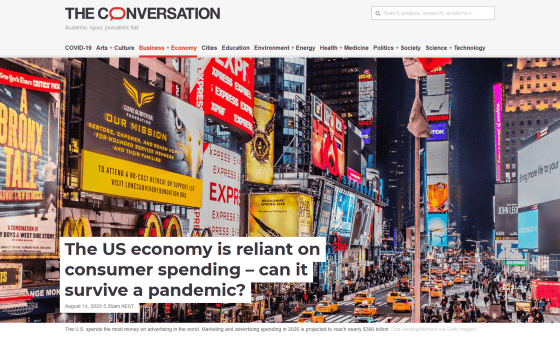Researchers argue that an economy that depends on mass consumption is pandemic vulnerable and bad for the environment, and that the economy should be transformed

The pandemic of the new coronavirus is affecting economies around the world, with reports of
The US economy is reliant on consumer spending – can it survive a pandemic?
https://theconversation.com/the-us-economy-is-reliant-on-consumer-spending-can-it-survive-a-pandemic-141244

The reduction in consumption associated with a pandemic may have a positive impact on the environment, but the damage to society and the economy is significant. Due to the recession, the unemployment rate in April 2020 reached the
'The consumer society is the social structure of the 20th century,' Brown said. Due to the concept of mass consumption that pervades American society, the word ' American dream ' is synonymous with buying cars, homes, furniture, and electronic devices. Pointed out that it has become. In the United States, personal consumption expenditure accounts for nearly 70% of GDP, and personal consumption behavior supports the economy.
It seems that the foundation of the consumer society in the United States was born after World War I, which was boosted by the advent of the advertising industry and the spread of consumer finance. Edward Bernays , who pioneered the marketing field in the 1920s, used the term 'consumer' to encourage people to consume by using human desires such as favorability, strength, and sexyness rather than product usefulness. I spread it.

And it is said that modern mass consumption was intentionally formed in the late 1940s and 1950s after World War II. During this period, the end of wartime industrial production forced companies to shift their huge production capacity from the military sector to the private sector. There, President
The government has made it a reasonable choice to have a home in the suburbs by improving roads and infrastructure with government-sponsored public works projects, while helping to buy a home by issuing loans to demobilized soldiers. .. In addition, it seems that people are now able to spend more money due to the enhancement of social security and the wage increase campaign by the labor union.
'At this historic turning point, businesses, governments and workers have come together towards the common goal of increasing consumer spending as the basis for economic prosperity and social harmony,' said Brown. The results of this collaboration are staggering, with US goods and services production doubling between 1946 and 1956, and doubling by 1970. It took less than a quarter of a century for many Americans to bring their homes to shopping centers and consumerism to become a fundamental value.
Also, as seen in the example of the ' kitchen debate ' in which Richard Nixon and Nikita Khrushchev discussed the economic system in front of kitchen products, 'consumerism' was capitalism against the Soviet communist system during the Cold War. It became a symbol of the superiority of the system.

However, Brown argues that today's consumer society is under pressure to rethink. As the consumer society has continued to expand since the 1950s, the concept of 'basic comfort for humans' has steadily grown. Now everyone has a device with the latest technology and ideally lives in a large, well-furnished house.
A lifestyle of buying and consuming large quantities means emitting a lot of carbon dioxide. Studies have shown that income is the best predictor of carbon dioxide emissions in households, and that this relationship is common to different countries, regardless of political views, education or attitudes towards the environment. That thing.
Maintaining a consumer society involves high environmental costs, and increasing household consumption will increase greenhouse gas emissions as GDP grows. Scientists and policy makers claim that 'advanced technology will make energy more efficient and the transition to renewable energy will reduce future greenhouse gas emissions,' but economic growth and greenhouses. Greenhouse gas emissions tend to be linked.
Brown argues that the pandemic of the new coronavirus has revealed vulnerabilities in a consumption-dependent economy. The government has changed its policy of supporting economies that depend on consumer societies, focusing on public spending and investment in areas such as education, healthcare, public transport, housing, parks, infrastructure and renewable energy, making the United States more Brown said it would be a good country.

Related Posts:
in Note, Posted by log1h_ik







